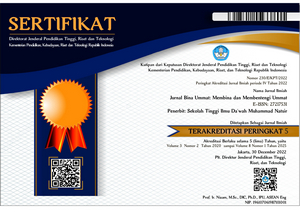LIVING AL-QUR`AN : SURAH YUSUF AYAT 108 DALAM PEMAKNAAN DA’WAH OLEH MAHASISWA PESERTA KAFILAH DA’WAH 2004
DOI:
https://doi.org/10.38214/jurnalbinaummatstidnatsir.v7i1.223Keywords:
BashirahAbstract
The purpose of this research is to reveal the interpretation of the Qur'anic verse Surah Yusuf verse 108 by the students participating in the Kafilah Da'wah program in 2024. To achieve this goal, I use a literature study approach based on the interpretations of Islamic scholars and a living Qur'an study based on observations, interviews, and documentation of the 2024 Kafilah Da'wah participants. The research findings reveal that the Kafilah Da'wah 2024 students have a fairly comprehensive understanding of the meaning of da'wah to Allah, which includes the objectives of da'wah, da'wah materials, da'wah strategies, as well as the inevitability of sincerity and sacrifice in da'wah. They also understand that bashirah in da'wah is not only about the da'wah message but also encompasses methods, strategies, and a thorough understanding of the audience (mad'u). The interpretation of the Qur'an developed among these students is in line with the interpretations from the exegetical works of Islamic scholars. The research also proves that Mohammad Natsir Insitute of Da’wah has become a leading institution in the cadre development of preachers (dai), not only in the transfer of knowledges but also in the inheritance of the core values of da’wah (transfer of values).
Published
Versions
- 2024-11-11 (3)
- 2024-06-25 (1)
Issue
Section
This work is licensed under a Lisensi Creative Commons Atribusi 4.0 Internasional.
Authors who publish with this journal agree to the following terms:
- Authors retain copyright and grant the journal right of first publication with the work simultaneously licensed under a Creative Commons Attribution License that allows others to share the work with an acknowledgment of the work's authorship and initial publication in this journal.
- Authors are able to enter into separate, additional contractual arrangements for the non-exclusive distribution of the journal's published version of the work (e.g., post it to an institutional repository or publish it in a book), with an acknowledgment of its initial publication in this journal.
- Authors are permitted and encouraged to post their work online (e.g., in institutional repositories or on their website) prior to and during the submission process, as it can lead to productive exchanges, as well as earlier and greater citation of published work (See The Effect of Open Access).




